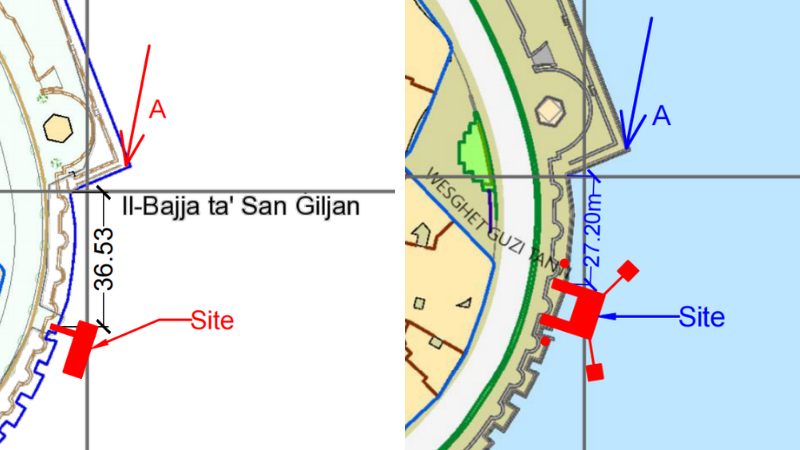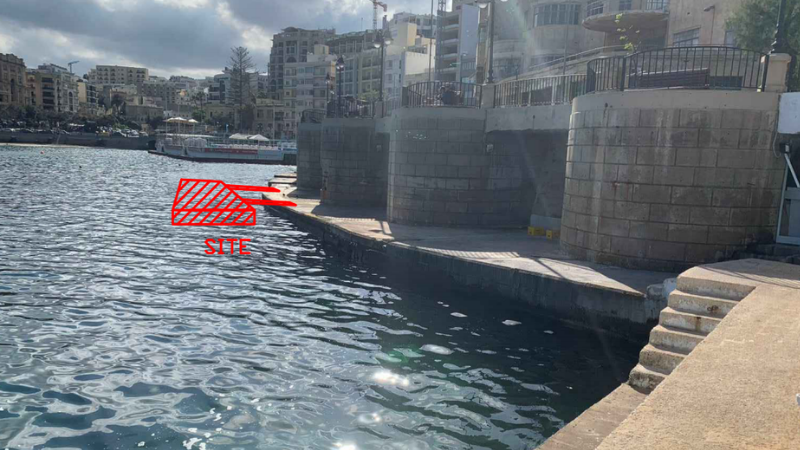Balluta Bay residents who’d been relieved when controversial plans for the construction of a private pontoon for the mooring of Captain Morgan vessels appeared to have been postponed were shocked this morning to see that a new development application has been filed, The Shift is informed.
The new application, filed by JeanBert Gatt as the COO of Fortina’s investments arm, the owners of the Captain Morgan franchise, is almost identical to its preceding application filed in 2019, except that the pontoon is now set to be larger, and positioned slightly further out.
The increase in the area to be taken up by the pontoon takes it from 81sqm to 130sqm, an increase of 49sqm, while the slight shift of the pontoon site, means it’s been moved 9.3m further out and away from Balluta Bay.

Site maps from the two applications: picture on the left shows site map for 2019, picture on the right shows site map for 2021. Source: Planning Authority
Despite hundreds of objections from residents and activists, including a week-long direct action which blocked works which Fortina attempted to force through earlier this year and the fact that the 2019 application is still pending an appeal, Fortina seems intent on pressing ahead with the project with its most recent version of the pontoon. The next sitting of the appeal is now set to be heard in February of next year.
Among the objectors’ submissions, several reports were submitted by independently commissioned experts which outlined the dearth of environmental impact assessments that have been carried out for the project. The experts include the Assistant Secretary General of the International Maritime Organisation and Earth Systems graduates among their ranks.
The independent reports, all based on technical studies submitted by the applicants, criticise the impact assessments on the basis of it being limited to the immediate area surrounding the envisaged pontoon and the Environment and Resource Authority’s failure to document potential impacts accordingly.
Overall, the pontoon is set to accommodate 33m-long ferries up to 21 times a day, with virtually all of the independent experts highlighting that such a high intensity of activity would affect all marine life in the area adversely.
One of the key threads mentioned through multiple independent reports is the effects such a pontoon and accompanying ferry route would have on marine life in the bay. In particular, a species known as Posidonia Oceanica, described as “the lungs of the Mediterranean” in the report filed by Nicholai Xuereb, one of the Earth Systems graduates, is under serious threat.
“This species is found within Balluta bay and parts of it will be directly beneath the area where the proposed pontoon will be built. P. oceanica is an extremely characteristic member of Maltese flora,” Xuereb wrote in his report.
“It is one of the most prolific and essential plants in our seas and carries out various services in order to support the habitat within which it’s found,” Xuereb’s report continues.
Virtually all the submitted reports stress that the impact assessment was not thorough enough in terms of the cumulative effects the development will have on the species that inhabit the area, with oxygen starvation for other species dependent on marine plants for their supply being a present, real risk. One of the experts even provided GoPro footage to the Planning Authority displaying the exact locations of the Posidonia meadows on the proposed ferry routes.
The reports also highlight how the route cuts directly through one of Malta’s marine Natura 2000 sites, spanning all the way from St Julian’s to Gozo.















